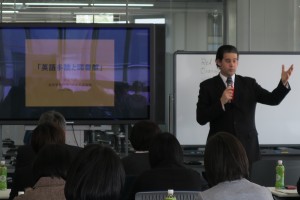Blogging
Today is a Leap Day so I am going to write a retrospective post.
I started this blog over ten years ago, on Blogger. Since then I have moved it to my own domain using WordPress and written 359 posts. This will be post 360.
It’s not the most successful blog, mainly because I haven’t been consistent in putting time and effort into it, and also because the teacher blog space is a little bit crowded. Lots of teachers with things to share and time on their hands out there 🙂
The main achievement is the longevity, I guess. Eleven years and counting.
I’ve enjoyed sharing ideas with people and reading their comments. The blog has 941 comments (although at least half of those are probably mine).
WordPress tells me the blog has had 137,448 views.
My most popular post by far is the throwaway one I wrote about bungee jumping. By a factor of at least ten.
There is also a sendaiben Youtube channel, with 7,390 views so far. It mainly has videos of my presentations, but I am thinking of putting more effort into it by making some shorter videos on teaching topics.
Looking back, there is a fair amount of good content on here, but it’s hard to find. I should probably go back and curate old posts, either putting them into ebook format or making better categories. Another project for the to-do list? I’m actually writing a post about to-do lists and productivity at the moment.
So there you go. More than you wanted to know about sendaiben.org.
How about you? How do you see this site? What would you like to see more of?
PRESENTATION: Fukushima Libraries’ Association
I was invited to speak to the Fukushima Libraries Association yesterday about extensive reading, creating ER sections for libraries, and working with teachers to promote ER.
The Fukushima University campus is stunning. I would love to work there.
You can see my slides (in Japanese) here.
160222 Fukushima University Library ER lecture
I had a great time and met some fantastic librarians. Hopefully some of them will become interested in extensive reading!
Charles Browne and the New General Service List
Vocabulary is the key to language
Yeah, not this Charlie Brown. Or this one.
I saw this great TEDx talk by Charles Browne the other day. I know his work, have heard him speak several times at conferences, and have even had a chat a few times, but this talk pulled everything together for me. You may know his work at Word Engine, English Central, or ER-Central (all very close to my heart). He’s talking about the importance of vocabulary and his new New General Service List of common English words for learners.
Well worth twelve minutes of your time!
OTWS Sendai Presentation Summary and Slides
I really enjoyed my presentation yesterday on the 30th floor of the AER Building in Sendai. The views were amazing and I am kicking myself for not getting some photos.
To make it up for you, here is a photo of the four presenters
I talked about starting reading programs, specifically:
- My dream, which is to see decent English ER programs in public schools
- Reasons for starting a program: some students love it, effectiveness as language study, can be a USP for a school
- Foundations of a reading program: songs and chants, phonics, good communication with parents, and reading in class
- Overview of a reading program: goals, money, materials, methods, and administration
- Some advice: have students read in class, get a wide range of books, don’t compare students to each other, don’t ask if students understood a book but whether they enjoyed it, and don’t expect quick results
- Further reading: Kunihide Sakai and Akio Furukawa
You can see my slides here:[Sendai OTWS reading program for young learners] and get in touch by email or with a comment below.
I’ll be doing this presentation in Omiya on March 6th, then that will be my last teaching presentation for a while.
Selling a Language School in Japan
But what’s it worth?
Many people in Japan think about opening their own English school. Some people actually do so. But what is the end game? What happens when you no longer want to operate your school?
One option is to sell it.
There are many things to consider when selling a school. I’ve been doing a bit of research on this recently, and it’s been interesting and a bit discouraging 🙂
Valuation
This is probably the hardest aspect of the whole thing. There is no easy way to decide how much a business is worth. Ultimately it comes down to how much someone is willing to pay for it, and whether the owner decides to accept that price.
Some metrics I have heard about are a price per current student, or a multiple of net annual profit (2-5 times seems possible).
Whether the school is a company or just privately run by an individual would appear to make a difference (it’s more valuable as a stand-along company).
Having the owners involved in teaching or admin roles makes the school less attractive, as the students may be there because of the personal connection and may leave when the owners do.
Any assets held by the school may be added to the purchase price, but most teaching materials or furniture probably aren’t worth very much second-hand.
Taxation
Now even if you manage to sell your school for an acceptable price, the government is going to want its share of the proceeds.
There appear to be two possibilities here. If the school is incorporated and was bought then capital gains tax might be payable.
If the school was privately held then income tax would be payable. Looking at national income tax, the brackets seem to be:
-under 1,950,000 yen 5%
1,950,000-3,300,000 yen 10%
3,300,000-6,950,000 yen 20%
6,950,000-9,000,000 yen 23%
9,000,000-18,000,000 yen 33%
18,000,000-40,000,000 yen 40%
Over 40,000,000 yen 45%
You would also have to add inhabitants tax of around 10%.
What this means for us
Well, my wife runs a small English school. We are considering a number of options for when we are no longer willing or able to run it, including selling or giving it to a family or staff member, selling it to a third party, or closing it down (and donating resources to local schools or organizations).
My research indicates that most schools seem to be bought and sold as fire, or forced, sales, when an owner needs to sell quickly as they are leaving the country. This results in low prices paid for schools.
For us, selling for three times net annual income doesn’t sound like a great deal, particularly if we do the work to make the school run without our day-to-day input. Once you consider the impact of taxes on the sale price, we’d be better off running it for another couple of years and would be able to save more than we would get in a sale price.
It’s not even much of a jump from a hands-off business to one that you could monitor remotely.
I guess if we ever reached the point where we didn’t want anything to do with the school I guess we could sell, but even in that situation I think I would rather sell to an owner operator and amortize the purchase price over a number of years, possibly by securing an advisory role. This would probably reduce taxes and increase the eventual gain from the sale.
Anyone have any advice/experience on this topic? Am I completely wrong on anything?
Edit: Steven N. posted this great article by Dean Rogers (who is a really approachable and helpful person) on the Facebook page. Well worth a look.






